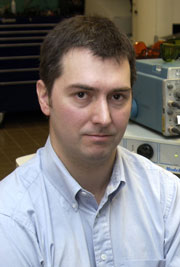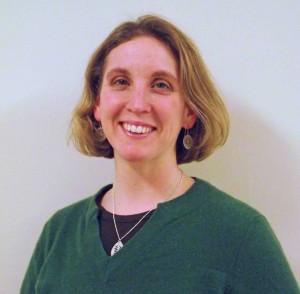Midwest Wine Programs in Transition
Michael Moyer didn’t hesitate to leave Walla Walla, Wash., for greener pastures this spring. After all, the job offer was huge. Could he launch the Midwest’s first — and only — commercial teaching winery in the upper Midwest?
Beginning this fall, students — with a cap at around 25 — at Lake Michigan College in Benton Harbor, Mich., can earn a certificate or associates degree in enology or viticulture from the newly formed Great Lakes Wine Institute. Research vineyards at nearby Michigan State University’s Southwest Michigan Regional Extension Center complement the ‘vine to glass” curriculum.
‘There are certainly going to be some jobs for our graduates. The Midwest — and Michigan, in particular — has the ability to grow in its vitis vinifera, especially in the Southwest part of the state,” says Moyer, who produced five vintages as associate winemaker and enologist at Figgins Family Wine Estates in Walla Walla, Wash., and taught wine science at Walla Walla Community College for seven years.
Across the Midwest, from Des Moines, Iowa, to Northeast Ohio, wine is as much an academic study as British History or pre-med. Programs, classes or certificates in viticulture and enology prepare students for careers in this growing industry. Previously, the only options for Midwesterners were to study fermentation at a select few universities across the country or relocate to California for wine-centric programs at the University of California-Davis and Fresno State University. Now they can stay near home.
This wine boom within academia dovetails with the region’s rising number of wineries. Last fall, the University of Wisconsin-Madison announced it would hire an outreach specialist for the state’s hard-apple-cider and wine industries — in response to the sectors’ rapid growth — helping with everything from equipment issues to microbial concerns, and offering winemakers access to its labs and experts. There are currently 110 wineries in Wisconsin, up from 13 in 2000.
‘The inspiration comes from people in the industry. The number of wineries that has opened in the last 10 years is astronomical,” says Jim Steele, heading up the university’s new Farm to Glass project. He likens the future of winemaking in Wisconsin to where the artisan-cheese movement currently is, with props to UW-Madison’s Wisconsin Center for Dairy Research and Wisconsin Master Cheesemaker Program.
‘The program is all about quality,” says Steele, who examined programs at UC-Davis and Cornell University while drafting one for UW-Madison. First up is a massive road trip to four different regions in Wisconsin, where listening sessions with local winemakers will help shape the program. Next, he’ll set up analytical support with microbiology and chemistry professionals. Students in this blended program will attend classes twice annually and also work with the grapes at a local vineyard in partnership with the university.
But the sweet spot is in Dr. Matt McCarroll’s hands at Southern Illinois University Carbondale, where the chemistry professor is tasked with leading the Midwest’s first four-year program with a concentration on enology. Although full approval was still being sought in February, the plan is to offer — beginning this fall — enrollment into a Bachelor’s of Science degree program in Fermentation Science, the first in Illinois. Students can choose to specialize in craft beer or wine. Since 2011 McCarroll has taught a course in brewing beer while Dr. Brad Taylor, a viticulture research specialist in the Department of Plant, Soil and Agricultural Systems, teaches a class in winemaking and helped launch a local wine trail.
‘There are at least two or three dozen wineries in our immediate area that have experienced growth in the last 20 years,” says McCarroll. ‘There’s a significant presence and an economic impact from that tourism. A lot of what we do at the Fermentation Science Institute is trying to support and foster new breweries and wineries in the area.”
Like Moyer, Dr. Jodi Creasap Gee — program director of Kent State University Ashtabula’s viticulture and enology degree programs with VESTA — is a recent transplant tasked with growing a wine program. Already in place for three years when she arrived in 2013, students earn an associate’s degree in enology or viticulture.
‘If we hadn’t had the VESTA support, this program wouldn’t be here,” says Creasap Gee. ‘We need to have the program to increase the quality of education but also improve the quality of wine and grape production.”
Creasap Gee has winemaking roots in her family tree: her grandfather owned a winery in Central Ohio for many years. Ohio currently has about 200 wineries but in 2000 there were only between 55 and 75, she says. ‘The growth has been exponential. It’s a huge economic driver for the state,” says Creasap Gee.
Similar to UW-Madison, course content is a hybrid of virtual and face-to-face learning. Twice a semester students travel to Kent State for lab work or meet at a winery or vineyard. (There is also a research vineyard at the Ashtabula Agricultural Research Station 15 miles from campus, negating the need to plant a teaching vineyard, says Creasap Gee.) The rest of the 16-week semester consists of weekly online classes.
Creasap Gee has noticed an uptick in enrollment every year. Currently there are 50 students from throughout Ohio. For the fall 2014 semester, 26 hailed from Kent State. ‘Our average student hovers around 40 years old. They are definitely (in their) second career. They want to retire and have a vineyard or winery or work at one,” says Creasap Gee. Only four have graduated — because most choose to audit the classes — but all four are employed in the industry, including managing a vineyard at an Ohio culinary school and working for a wine-packaging company in New York’s Finger Lakes region. According to Creasap Gee, some Ohio wineries pay their employees to take the VESTA courses.
Students attracted to these programs are largely non-traditional in age and pursuing a second — or third — career. Most have a bachelor’s degree, perhaps in an unrelated industry, and some are retired, which means they audit the courses. Many are driven by a desire to move their winemaking hobby into a professional venture.
That said, Steele is in contact with many in their 20s and 30s. ‘We are reaching that second generation of owners at some wineries,” he says. Whether they are taking over the family business or moving up from cellar master to owner, one thing is for sure: quality is in pursuit.
That the quality of wine in the Midwest has improved over the last decade — from ‘the sweeter, lower-end wines,” as Moyer calls them, into wines that bump up against Bordeaux on restaurants’ wine lists — helps the cause. ‘There are people — particularly in Traverse City — who are trying to elevate the game and make wines that can be respected and compared to other parts of the U.S.,” he says.
‘We already have a tourism economy and a lot of affluence coming from Chicago. That sets a market that has yet to be tapped into,” says Moyer.
Steele, of UW-Madison, feels similarly. ‘We want there to be a very positive connotation when people see wines from Wisconsin,” he says.
Graduates might snag jobs not only at wineries in the Midwest, but wine-related businesses too. These could include suppliers of corks and barrels, website design and marketing for the wine industry, and warehouse management catering to wineries. The only gap Moyer sees is laboratory support, but he feels that will evolve as more wine-focused graduates enter the workforce. ‘I see the industry growing and we want to be a part of training and giving these students a solid foundation.”
McCarroll agrees. ‘Geographically, in the Midwest or even on the East Coast, we serve a need here,” he says, likening the Midwest’s current wine boom with Northern California during the 1970s. ‘I’ve already had enough inquiries to fill the program.”





Congrats Lake Michigan College! Great write-up, and thanks for giving VESTA props! I don’t mean to stir the pot so to speak, but there are a handful of already existing commercial teaching wineries in the Midwest: Missouri State University (Mountain Grove Cellars); Redlands Community College, OK (Chapel Creek Winery); and Highland Community College, KS (HCC Winery) have commercial teaching wineries. Regardless, congratulations on the new program and good luck!
Hi Scott! Thanks for reading and I really appreciate your chiming in. It’s so great to hear that other Midwestern colleges and universities have commercial teaching wineries too.